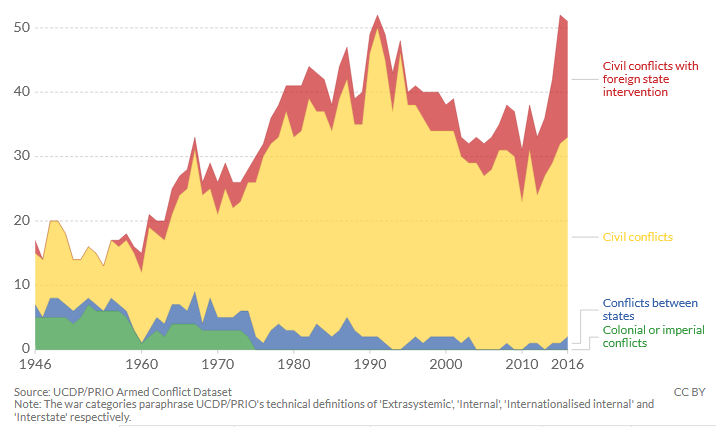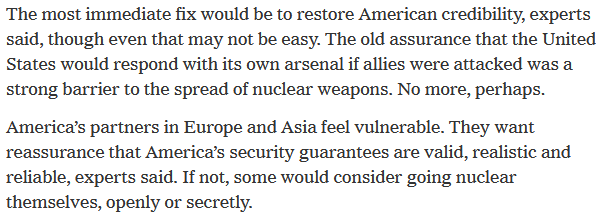
The @WhiteHouse released an "Interim National Security Strategic Guidance" this week. After reading it, I'm sure international relations scholars will go.....hmmmmmm 🤔
[THREAD]
whitehouse.gov/briefing-room/…
[THREAD]
whitehouse.gov/briefing-room/…
Don't get me wrong. I agree with @MatthewKroenig that releasing this document is a good thing: folks are anxious to know more about what "America is Back" means. This document offers some...well..."guidance" (hence the name)
https://twitter.com/MatthewKroenig/status/1367224170157850624
And given how early it is being released (for example, 2017 NSS wasn't released until December of Trump's first year) sends a useful signal about intentions
https://twitter.com/RHFontaine/status/1367882233420386311
The report is full of typical verbiage one would expect from a foreign policy document (especially in 2021): references to "competition", "Indo-Pacific" (though not with the "free and open" qualifier), "great powers", and "China" (lots of "China").
Though, as @ALanoszka points out, not as many China/Russia references as one would expect
https://twitter.com/ALanoszka/status/1367229538133016579
Where I think IR scholars will 🤨 (or have fun making it an assignment for their students to decipher) is when reading the overarching objectives. 

The first objective is pretty innocuous: "American must be strong at home". Everyone agrees on that (disagreement is whether one should then add "in order to lead abroad") 

As Waltz writes, international politics is driven by the distribution of power/capabilities (and, in particular, changes to it) 

A "Favorable" distribution is important to Realists for a reason that JJM well captured years ago in @Journal_IS
jstor.org/stable/2539078…
jstor.org/stable/2539078…

As he writes, the outcomes of bargaining, the shape of international institutions, and the prospects for war and peace are largely determined by the distribution of power 

So the second statement sounds like it's lifted straight from a Neorealist playbook!
One reason this is interesting is that a phrase like "distribution of power" did NOT appear in the Trump Administration's 2017 NSS (even though it was viewed as a Realist document)
trumpwhitehouse.archives.gov/wp-content/upl…
trumpwhitehouse.archives.gov/wp-content/upl…

But another reason the phrase is interesting is to compare the second objective to the third objective.
Here, again, is the text of the third objective
Here, again, is the text of the third objective

"stable and open international system"?
"multilateral institutions"?
"Rules?"
All that sounds like Neoliberal Institutionalism 101
google.com/books/edition/…
"multilateral institutions"?
"Rules?"
All that sounds like Neoliberal Institutionalism 101
google.com/books/edition/…
Indeed, he and Lisa Martin elaborate on the value of institutions in their famous rebuttal of Mearsheimer
jstor.org/stable/2539214…
jstor.org/stable/2539214…

They list the various ways in which multilateral institutions can have an effect on international cooperation 

But they do acknowledge that Institutionalist theory could better account for "distributional considerations" 

Ikenberry offers a modification of Liberal theory that recognizes the role of power distribution in the creation of institutions... 

...but then says that those institutions can constrain how states use their power (Keohane and Martin didn't go that far) 

Coming back to the "interim guidance" document, seems it is putting forward a policy that will seek to achieve BOTH realist objectives - favorable balance of power - and institutionalist objectives - support institutions that constrain power.
But can both actually be done? Wouldn't attempts at changing the balance of power require taking steps that could undermine existing institutions?
This is where the key word/phrase is important...
This is where the key word/phrase is important...
The third objective states "Democratic alliances".
Ahhh...so this is about what @kylelascurettes would call "Orders of Exclusion"
google.com/books/edition/…
Ahhh...so this is about what @kylelascurettes would call "Orders of Exclusion"
google.com/books/edition/…
The goal is to have an "Alliance of Democracies"...
thechicagocouncil.org/commentary-and…
thechicagocouncil.org/commentary-and…
...and perhaps that can facilitate a shift in the "distribution of power" that is favorable for the US to compete.
warontherocks.com/2020/10/compet…
warontherocks.com/2020/10/compet…
Or maybe I'm thinking too hard about it.
Perhaps the Biden administration wants to be BOTH a realist and a liberal institutionist? In other words, maybe they want a "Quantum Foreign Policy"? 🤔🤔🤷♂️
google.com/books/edition/…
Perhaps the Biden administration wants to be BOTH a realist and a liberal institutionist? In other words, maybe they want a "Quantum Foreign Policy"? 🤔🤔🤷♂️
google.com/books/edition/…
Anyhow, you hopefully see my point: for international relations scholars, this is NOT a straightforward document. It could be Realist. It could be Liberal Internationalist. It could be both!
[END]
[END]
Addendum: Great followup thread by @dhnexon
adds context (how "balance of power" is used outside of realism) and highlights how "favorable balance of Power" is a phrase with a LONG history in US foreign policy docs (going back to Cold War)
adds context (how "balance of power" is used outside of realism) and highlights how "favorable balance of Power" is a phrase with a LONG history in US foreign policy docs (going back to Cold War)
https://twitter.com/dhnexon/status/1368306911687438340
Addendum 2: the 2017 NSS does use phrase “favorable BALANCE of power”, just not “distribution of power” (thanks @daninedal for the FYI). Realist credentials of 2017 NSS confirmed 😉
Actually, consistency with other NSSs confirmed (see first Addendum).
Actually, consistency with other NSSs confirmed (see first Addendum).
• • •
Missing some Tweet in this thread? You can try to
force a refresh









